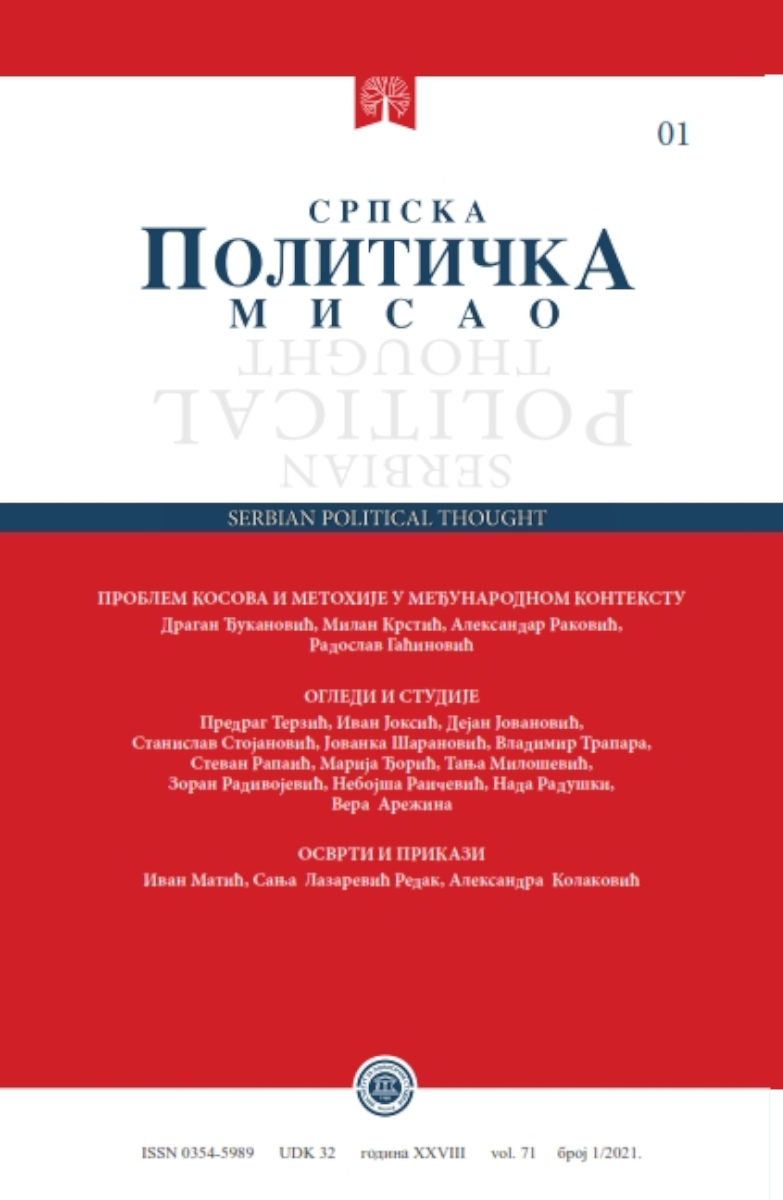ДРУШТВЕНЕ ИМПЛИКАЦИЈЕ ИНТЕРНЕТА У НОВОЈ РЕАЛНОСТИ ТОКОМ КОВИД-19
Сажетак
Друштвене импликације информационо-комуникационих технологија (ИКТ), интернета и сајбер простора зависе од економских, правних и политичких одлука. Пандемија је створила нову реалност која обликује интернет који проналази примену у готово сваком домену. Овај рад разматра нову друштвену реалност насталу услед КОВИД-19 помоћу три нивоа анализе: макро, мезо и микро ниво анализе. Током пандемије изазване вирусом КОВИД-19, социјално дистанцирање постало је део свакодневног живота широм света, а дом канцеларија. Како опасност од вируса КОВИД-19 мења досадашње институционалне приоритете и руши некадашње границе јавно-приватне сфере? Значајан део расправе о пандемији, интернету и њиховом утицају на друштвени капитал односи се на то да ли интернет слаби међуљудске односе својих корисника или пак доприноси њиховом јачању у постојећој новој реалности. Неупитно постоји потреба за активним проучавањем интернета, а нарочито за систематизацијом досадашњих налаза истраживања о друштвеним импликацијама интернета.
Референце
- Barlow, John Perry, Birkets, Sven, Kevin Kelly and Mark Slouka. 1995. “What Are We Doing On-Line?” Harper’s. 291, 35‒46.
- Burrows, Mathew and Peter Engelke. 2020. What World POST-COVID-19? Three Scenarios, Atlantic Council: Scowcroft Center for Strategy and Security.
- Calhoun, Craig. 1998. “Community without propinquity revisited: communication technology and the transformation of the urban public sphere.ˮ Sociological Inquiry, 68 (3): 373–397.
- Castells, Manuel. 1996. The Rise of the Network Society. Vol. 1 of The Information Age: Economy, Society and Culture. Oxford, UK: Blackwell’s.
- China-CEE Institute 2021. “Serbia economy briefing: Economic Forecast for Serbia in 2021.ˮ March 8, 2021. Last access 4 May 2021
https://china-cee.eu/2021/03/08/serbia-economy-briefing-economic-forecast-for-serbia-in-2021/. - Congressional Budget Office [CBO] 2021. The Federal Budget in Fical Year 2020.
https://www.cbo.gov/system/files/2021-04/57170-budget-infographic.pdf. - DiMaggio, Paul, Hargittai Eszter, Neuman Russell W., and John P. Robinson. 2001. “Social Implications of the Internet.ˮ, Annual Review of Sociology 27: 307–36.Foust, Jeff. 2021. “Russia continues discussions with China on lunar exploration cooperation.ˮ Space News. Last access April 4 2021.
https://spacenews.com/russia-continues-discussions-with-china-on-lunar-exploration-cooperation/.Franzen, Axel 2000. “Does the Internet Make Us Lonely?ˮ. European Sociological Review 16 (4): 427‒438. Goffman, Erving. 1990. The presentation of self in everyday life, London: Penguin Books. - Habermas Jirgen. 1989. The Structural Transformation of the Public Sphere. Cambridge MA: MIT Press.
- International Monetary Fund [IMF] 2021. IMF Country Information.
https://www.imf.org/en/Countries. - Jeffrey C., Alexander. 2018. “The Societalization of Social Problems Sourceˮ. American Sociological Review 83 (6): 1049‒1078. doi:
https://doi.org/10.1177/0003122418803376. - Koku, Emmanuel, Nazer Nancy and Barry Wellman. 2001. “Netting Scholars: Online and Offline.ˮ American Behavioral Scientist, 44, 1750‒72.
- Kraut, Robert, Patterson Michael, Lundmark Vicki, Kiesler Sara, Mukophadhyay Tridas and William Scherlis. 1998. “Internet paradox: A social technology that reduces social involvement and psychological well-being?.ˮ American Psychology 53 (9): 1011–1031.
- Ku, Agnes. 1998. “Boundary Politics in the Public Sphere: Openness, Secrecy, and Leak.” Sociological Theory, 16 (2): 172–192.
- Lukar, Ivana. 2020b. “Cyber terrorism threat and the pandemic.ˮ In International Scientific Conference The Euro-Atlantic Values In the Balkan Countries, Ed. in chief. Cane T Mojanoski, Bitola: University “St. Kliment Ohridski”, Skopje: Faculty of Security. 1 (3): 29‒38. doi: 10.20544/ICP.11.01.20.p29.
- Luknar, Ivana. 2020a. “Cybercrime-Emerging issue.ˮ In Archibald Reiss Days. Thematic Conference Proceedings of International Significance University of Criminal Investigation and Police Studies, Ed. in chief. Stevo Jaćimovski. University of Criminal Investigation and Police Studies. 10: 621‒628. Belgrade:
http://eskup.kpu.edu.rs/dar/issue/view/5/1. - Neuman, W.Russell, O’Donnell S.R., and Steven M.Schneider. 1996. In: DiMaggio, P., Hargittai E., Neuman R.W., and Robinson P.J. 2001. “Social Implications of the Internet.ˮ Annual Review of Sociology 27, 316.
- Nie, Norman. 2001. “Sociability, Interpersonal Relations, and the Internet: Reconciling Conflicting Findings.ˮ American Behavioral Scientist 45 (3): 420–435.
- Nie, Norman.H and Erbring. Lutz. 2000. Internet and Society: A Preliminary Report. Stanford, CA, Institute for Quantitative Study of Society.
- Parigi, Paolo and Warner Henson II. 2014. “Social Isolation in America.ˮ Annual Review of Sociology 40, 153‒171.
- Schröder, Patrick 2021. “US-China relations: Turning crisis into opportunity?ˮ. Chatham House. Last access 26 March 2021.
https://www.chathamhouse.org/2021/03/us-china-relations-turning-crisis-opportunity? gclid=EAIaIQobChMIlJfi1ZC38AIVjpCyCh3xQAsDEAAYAiAAEgJCzPD_BwE. - Shah, Davan, Schmierbach, Michael, Hawkins, Joshua, Espino, Rodolfo, and Janet Donavan. 2002. “Nonrecursive models of the Internet use and community engagement: questioning whether time spent online erodes social capital.ˮ JGMC Quarterly 79 (4): 964‒987.
- Wellman, Barry 2001. “Physical place and cyberplace: The rise of personalized networking.ˮ International Journal of Urban and Regional Research 25 (2): 227‒252.
- Wellman, Barry, Quan-Haase, Anabel, Boase, Jeffrey and WenhongChen. 2002. “Examining the Internet in Everyday Life.ˮ Centre for Urban and Community Studies. University of Toronto. Last access
https://www.researchgate.net/publication/2552018_The_Internet_in_Everyday_Life.

 Др Ивана Лукнар
Др Ивана Лукнар